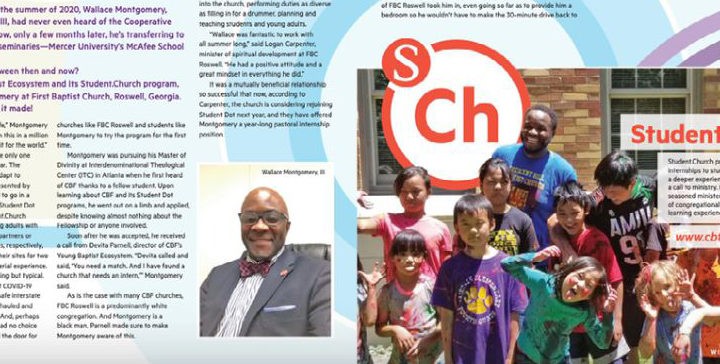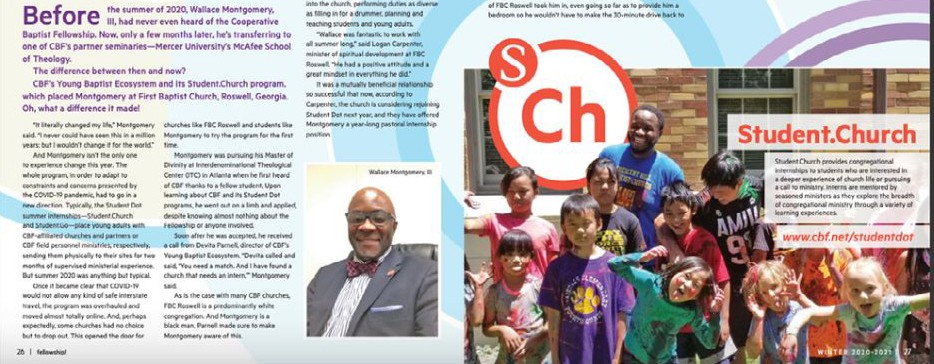Seminarian Wallace Montgomery III is brand new to the Cooperative Baptist Fellowship and to the moderate Baptist movement — things he didn’t even know existed until last spring.
But the 35-year-old Arkansas native already is planting roots in CBF life. Last August he transferred to Mercer University’s McAfee School of Theology and began an ongoing Student.Church pastoral ministry internship at First Baptist Church in Roswell, Ga., over the summer.
“Other than my family, I never really fit in anywhere,” he said. “Socially, I never really felt like I fit anywhere. But here, I feel like I fit. Yeah, I’m Black. There’s one of me and hundreds of them, but they make it clear I am one of the crew. At the core of my being, I know I belong here.”
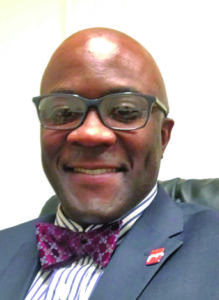
Wallace Montgomery
Montgomery grew up in a predominantly Black church and denomination, in which his father served as a pastor. He first sensed a calling to ministry as a teenager and finally surrendered to that call after a divorce at 33. After a decade selling insurance, he entered seminary at Interdenominational Theological Center in Atlanta.
It was there, during a chapel service in the spring of 2020, that Montgomery heard a pitch for CBF’s Student.Church program. “Honestly, I had never heard of this organization before,” he said.
But as he did his homework on the Fellowship and encountered its people, Montgomery said it became clear that’s where he and his ministry belong. CBF, Student.Church and First Baptist Roswell have changed his heart.
“This has prepared me for ministry by pushing me out of my comfort zone,” he said. “This has challenged me to always bring my ‘A’ game.”
Montgomery spoke with Baptist News Global about his journey to the progressive Baptist movement. He also shared about the personal transformations that prepared him to make the transition.
Where did you grow up, geographically and religiously speaking?
El Dorado, Ark., is where I grew up. That’s where I had my religious foundation. That’s in rural Arkansas, and I went to church at Mount Calvary Baptist Church. It was affiliated with National Baptist Convention of America.
When did you first sense a calling to be a pastor?
Honestly, I was a Sunday-Wednesday-only Christian growing up, and around the age 16 I knew I was living a life that was pleasing to my peers but was not pleasing to God. I knew I wasn’t doing what I was supposed to do. But I didn’t want to process all that at 16. I’m not going to say God came down and talked to me, but by the age of 19 I accepted the fact I had a calling on my life. That was when I could no longer fight it. But I didn’t want to do seminary because my dad did that and it was kind of a rebellious thing I maintained until the bottom fell out of my life with that divorce. I had all this guilt and shame and felt like I had let my family down, my community. At this point in my life, I didn’t have anything but God. That is when I began seminary at Interdenominational Theological Center.
At that time, what kind of church did you see yourself eventually leading?
I thought it would be a predominantly African American church. I grew up in a predominantly African American denomination and predominantly African American church prior to coming to Roswell and to McAfee. Maybe a rural church. Medium-sized. Maybe 300 to 500 members. That had been my experience growing up. That’s where I got my foundation. But that has changed. Now I don’t have a goal at being in a church based on any ethnic or racial group. Right now, my focus is to go where I am sent, however it looks.
Are you comfortable with the idea of being in a mostly white congregation?
I am because this experience (at First Baptist Roswell) has changed me. Of course, you can look out and see everyone is white, but when I am at worship, I see broken people, myself included. And we all need a word from Christ. We all have something pulling on us. Someone may be putting their marriage on the altar while for me it is my finances. But we are both putting it on the altar. I just see broken people who want to be whole.
What were your first impressions of CBF?
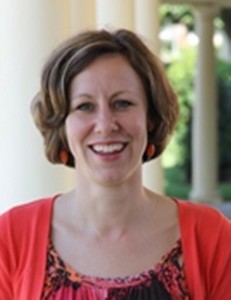
Devita Parnell
I did my due diligence. I perused their website. I read “About Us” and “History,” and I liked what I saw. But it became tangible when I met Devita Parnell (director of the Young Baptist Ecosystem) at CBF. This wasn’t about being moderate Baptists or the movement. All of that went out the door. It was one person making contact with another person. She didn’t present herself as pious.
She also had called just to check on me. Only my mom and auntie call me to check on me and how I am doing. That’s my first conversation with Devita. She was my (Student.Church) supervisor but she didn’t speak from a place of authority. That’s when it became tangible for me. This was no longer about the internship or the stipend. It was no longer about building my resume or social capital. Now I wanted to give my all because now I know I matter.
Did you go to First Baptist Roswell with doubts?
One hundred percent, yes. I was scared, totally nervous. I hadn’t been in a congregational setting where I was the only person who looked like me. It felt different than school growing up. I was used to being the only African American in a room in school. And I already had done the research on the church as well. I knew it was an affluent suburban community. So, it was total trepidation — especially on the first day.
How and when did that nervousness begin to subside?
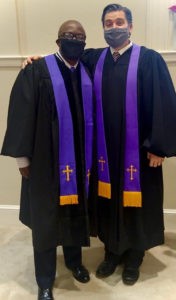
Wallace Montgomery with Logan Carpenter, minister of spiritual development at First Baptist Church in Roswell, Ga.
That also began on the first day. I thought I was just meeting (Minister of Spiritual Development) Logan Carpenter for a meet-and-greet, but what actually happened was that I had to play drums for a youth rock group. That dropped my nerves a lot because I know how to play. It’s no big deal. That was the first day. What also helped was that I created my own interview questions and I interviewed the entire ministerial staff, one on one. From that we established relationships, so I was comfortable speaking to everybody on the staff even though I was still nervous in church with the congregation.
How did that improve?
It wasn’t that the congregation mistreated me in any way. I was just nervous. And once those relationships with the staff began to develop, it trickled into the congregation. What I quickly saw was that even though no one looked like me, we had many of the same experiences. I began to see so many similarities between us that my nervousness and trepidation just dropped from me and as time progressed.
How has the internship helped prepare you for future ministry?
It has prepared me for ministry by pushing me out of my comfort zone. This position made me so uncomfortable that I had to work extra hard to do my best. Before coming to Roswell, I had never been uncomfortable in ministry before.

